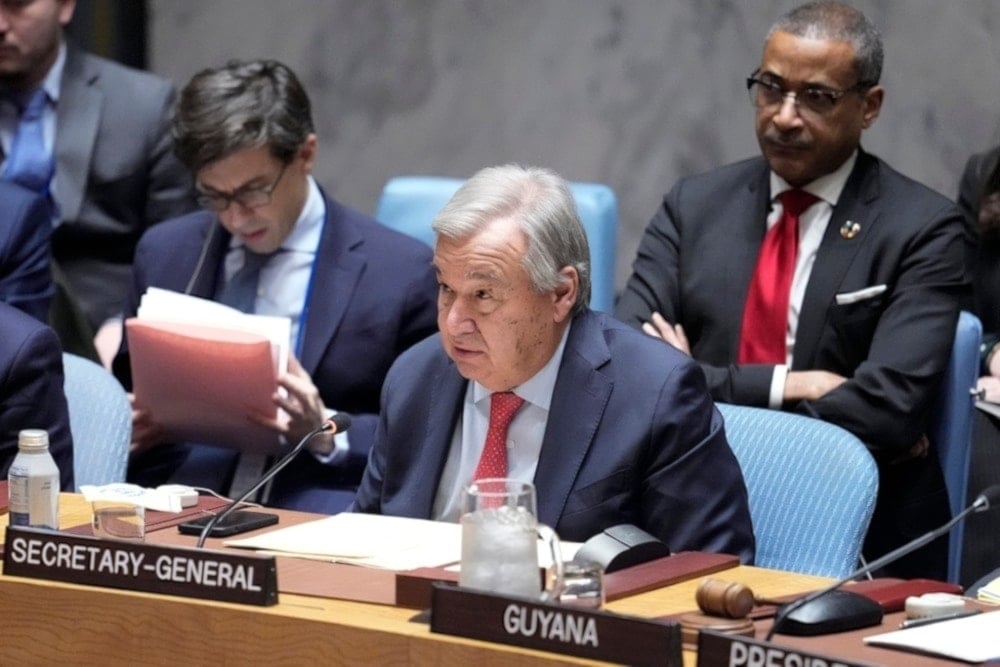UN chief expresses alarm over Syria crisis, urges end to fighting
As of November 30, over 48,500 people have been displaced in Idlib and northern Aleppo, more than half of them children, according to OCHA.
-

UN Secretary-General Antonio Guterres addresses a Security Council meeting, on Friday 23, 2024, at United Nations Headquarters. (AP)
UN Secretary-General Antonio Guterres expressed being "alarmed" by the intensifying violence in Syria and urged for an immediate cessation of hostilities, which the UN says have displaced nearly 50,000 people.
"All parties must make every effort to protect civilians and civilian infrastructure, including by ensuring safe passage for those fleeing the fighting," said UN Secretary-General Antonio Guterres' spokesperson, Stephane Dujarric, in a statement.
"Syrians have suffered through nearly 14 years of conflict. They deserve a political solution that offers a peaceful future, not further bloodshed," he continued.
As of November 30, over 48,500 people had been displaced in Idlib and northern Aleppo, more than half of them children, according to the UN's humanitarian agency OCHA. The situation remains highly fluid, the agency noted.
"Tens of thousands of people on the move; critical services interrupted; women, men, and children fearing for safety," OCHA chief Tom Fletcher stated on X, calling the situation "worrying".
"Syrians have already endured over 13 years of suffering. All sides must do more to protect civilians," Fletcher added.
Moreover, Al Mayadeen's correspondent in Geneva, quoting the Office of the United Nations High Commissioner for Human Rights (OHCHR), said tens of thousands of Aleppo residents have been displaced since November 27, and their situation has now become critical as winter sets in.
Life-saving aid is largely unable to reach the conflict zone in northern Syria, the office further warned.
Escalating displacement and health risks
The displacement figures marked a significant rise from the 14,000 people reported on November 28.
According to Dujarric, UN peacekeeping operations have been "largely suspended" in Aleppo, Idlib, and Hama due to security concerns, resulting in "severe disruption in people's ability to access life-saving assistance."
"The United Nations remains committed to delivering humanitarian aid," he continued but warned that "the presence of unburied bodies and lack of drinking water" in Syria poses serious public health risks. He also noted that damage to Aleppo's university hospital has left hundreds of patients without care.
"Syria is also already one of the world's largest humanitarian crises, with 16.7 million people in need of assistance and over seven million internally displaced," he said.
Dujarric also pointed out the impact of "Israel's" intensified offensive against Lebanon since September, noting that "more than half a million people have also fled from Lebanon to Syria in recent weeks," with winter conditions expected to exacerbate the situation in the coming weeks.
Driving the news
This comes as the Syrian army continues to confront terrorist militants, emphasizing on Monday its units' readiness and determination to continue their operations and confront terrorist groups to expel them from the north of the country.
A statement issued by the General Command of the Syrian Army and Armed Forces on Monday indicated that in 24 hours, operations continued in cooperation with the Russian forces, carrying out focused air, missile, and artillery strikes on terrorist positions, their warehouses, supply lines, and movement corridors in the rural areas of Aleppo and Idlib.
The statement confirmed that the precise strikes carried out by the Syrian Armed Forces, in cooperation with Russian forces, destroyed five command centers, and seven ammunition and weapon storage sites, some of which contained drones, in 24 hours.
Additionally, more than 400 terrorists, including individuals of various foreign nationalities, were eliminated in the past hours in the rural areas of Aleppo and Idlib.
The statement also highlighted taking action on several fronts in the countryside of Aleppo, Hama, and Idlib to encircle and expel terrorists from areas they had entered, securing them fully, and establishing new positions in preparation for the next offensive. These movements are taking place alongside the continued arrival of further military reinforcements to the conflict zones.

 4 Min Read
4 Min Read










